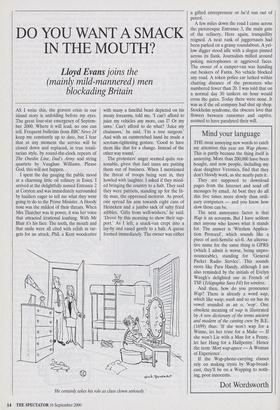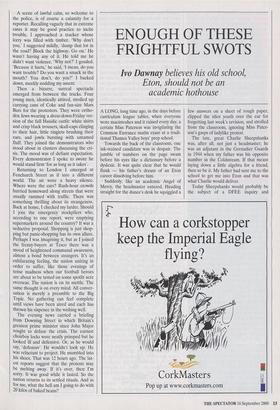DO YOU WANT A SMACK IN THE MOUTH?
Lloyd Evans joins the
(mainly mild-mannered) men blockading Britain
AS I write this, the gravest crisis in our island story is unfolding before my eyes. The great four-star emergency of Septem- ber 2000. Where it will lead, no one can tell. Frequent bulletins from BBC News 24 keep me constantly up to date, but I fear that at any moment the service will be closed down and replaced, in true totali- tarian style, by round-the-clock repeats of The Onedin Line, Dad's Army and string quartets by Vaughan Williams. Please God, this will not happen.
1 spent the day gauging the public mood at a charming little oil refinery in Essex. I arrived at the delightfully named Entrance 2 at Coryton and was immediately surrounded by hauliers eager to tell me what they were going to do to the Prime Minister. A bloody nose was the mildest of their threats. When Mrs Thatcher was in power, it was her voice that attracted irrational loathing. With Mr Blair it's his face. The teeth, the mouth and that smile were all cited with relish as tar- gets for an attack. Phil, a Kent woodcutter with many a fanciful beast depicted on his meaty forearms, told me, 'I can't afford to juice my vehicles any more, can I? Or my saws.' Can't afford to do what? 'Juice my chainsaws,' he said, 'I'm a tree surgeon.' And with an outstretched hand he made a scrotum-tightening gesture. 'Good to have them like that for a change. Instead of the other way round.'
The protesters' anger seemed quite rea- sonable, given that fuel taxes are putting them out of business. When I mentioned the threat of troops being sent in, they howled with laughter. I asked if they mind- ed bringing the country to a halt. They said they were patriots, standing up for the lit- tle man, the oppressed motorist. As proof, one spread his arm towards eight cans of Heineken and a jumbo sack of salty fried nibbles. 'Gifts from well-wishers,' he said. `Drove by this morning to show their sup- port.' As I left, a snack-van crept into a lay-by and eased gently to a halt. A queue formed immediately. The owner was either He certainly takes his role as class clown seriously.' a gifted entrepreneur or he'd run out of petrol.
A few miles down the road I came across the picturesque Entrance 3, the main gate of the refinery. Here again, tranquillity reigned. A neat rank of juggernauts had been parked on a grassy roundabout. A yel- low digger stood idle with a slogan pinned across its flank. Journalists milled around poking microphones at aggrieved faces. The owner of a camper-van was handing out beakers of Fanta. No vehicle blocked any road. A token police car lurked within chatting distance of the protesters who numbered fewer than 20. I was told that on a normal day 30 tankers an hour would cross the gates. Today there were none. It was as if the oil company had shut up shop. Stockholm syndrome, the obscure love that flowers between ransomer and captive, seemed to have paralysed their will. A scene of lawful calm, so welcome to the police, is of course a calamity for a reporter. Recalling vaguely that in extreme cases it may be good practice to incite trouble, I approached a trucker whose lorry was filled with timber. 'Why don't you,' I suggested mildly, 'dump that lot in the road? Block the highway. Go on.' He wasn't having any of it. He told me he didn't want violence. 'Why not?' I goaded. `Because it hurts,' he said, mean, do you want trouble? Do you want a smack in the mouth? You don't, do you?' I backed down, meekly nodding my assent.
Then a bizarre, surreal spectacle emerged from between the trucks. Four young men, identically attired, strolled up carrying cans of Coke and fun-size Mars Bars for the protesters. They were ortho- dox Jews wearing a dress-down-Friday ver- sion of the full Hasidic outfit: white shirts and crisp black trousers, skull-caps clinging to their hair, little ringlets brushing their ears, and jowls bursting with untamed fluff. They joined the demonstrators who stood about in clusters discussing the cri- sis. The mood was of defiant expectation. Every demonstrator I spoke to swore he would stand firm 'for as long as it takes'.
Returning to London I emerged at Fenchurch Street as if into a different world. The air wore a heavy silence. Where were the cars? Rush-hour crowds hurried homeward along streets that were usually rammed with traffic. There was something thrilling about its strangeness. Back at home, I checked my larder. Should I join the emergency stockpilers who, according to one report, were emptying supermarkets around the country? It was a seductive proposal. Shopping is just shop- ping but panic-shopping has its own allure. Perhaps I was imagining it, but as I joined the frenzy-buyers at Tesco there was a mood of heightened communal awareness, almost a bond between strangers. It's an exhilarating feeling, the nation uniting in order to suffer, like those evenings of tense madness when our football heroes are about to be tested on some spotlit acre overseas. The nation is on its mettle. The same thought is on every mind. All conver- sation is merely a preamble to the Big Topic. No gathering can feel complete until views have been aired and each has thrown his sixpence in the wishing well.
The evening news carried a briefing from Downing Street in which Britain's greatest prime minister since John Major sought to defuse the crisis. The earnest choirboy locks were neatly primped but he looked ill and defensive. Or, as he would say, `defensuy'. He wouldn't look up. He was reluctant to project. He mumbled into his shoes. That was 12 hours ago. The lat- est reports suggest that the protests may be melting away. If it's over, then I'm sorry. It was good while it lasted. So the nation returns to its settled rituals. And as for me, what the hell am I going to do with 20 kilos of baked beans?



































































 Previous page
Previous page